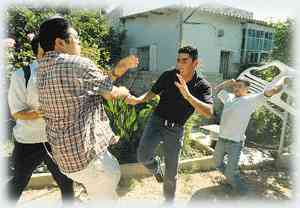 |
 |

Jewish World Review / July 8, 1998 / 14 Tamuz, 5758
 |
|
Two Palestinians fight off settlers attempting to enter building purchased by other settlers in the East Jerusalem village of Silwan |
Love -- and leave --
LIKE THE U.S .CONGRESS, I firmly believe that Jerusalem is Israel's "eternal capital" and that it should remain undivided under Israeli sovereignty. I also believe that in principle, at least, all of Jerusalem' s citizens -- Jews and Arabs -- have a legal right to live anywhere in the holy city they want and can afford to.
But the recent pre-dawn takeover of four houses in Jerusalem's ancient and predominantly-Arab Silwan district by a handful of Jewish extremists (who forcibly evicted several Palestinian families in the process), was as boneheaded as it was callous.
The settlers -- members of a right wing religious group called Elad -- claim they had both legal and historic rights to do their deed. They say they legitimately -- if indirectly -- purchased three of the houses, and received the right to toss out the inhabitants of the fourth because the original owner, the father of the woman living there, had lost a legal claim to the house by fault (he'd been absent from Jerusalem during an Israeli census study in 1967).
The real "right," Elad's members claim, however, is that Silwan, which sits just south of Jerusalem's walled city, is the site of the ancient Ir David, the original City of David, the spot where the King of Israel built his capital more than 3000 years ago. The settlers say it should again become "a Jewish neighborhood." As their spokesman, Yehuda Mall, asks rhetorically: "It was the home of King David. Here he wrote the Psalms here and Jewsare not allowed to live?"
Jerusalem's police backed the settlers, claiming their "entry was legal." And the government of Israeli prime minister Benjamin Netanyahu, which was quick to insist that it had nothing to do with the block busting, said it saw "no reason ... why these people cannot be in the City of David.
I'll give them at least one good reason: the Mideast Peace Process.
For it's precisely this type of ill conceived provocation -- and that's what the seizure of the Silwan buildings was -- that could easily destabilize an already shaky peace process. All but frozen for months now, there have been some fragile signs of new movement in Israeli-Palestinian negotiations. After weeks of American shuttle diplomacy, both Palestinian and Israeli sides seemed to be edging towards agreement on moves that would mutually assure new steps forward. The Palestinians were going to finally take effective steps against their terrorists and extremists; the Israelis would continue withdrawals from predominantly Palestinian areas of the West Bank.
I suspect that it was precisely because a breakthrough seems imminent that the settlers and their supporters chose this moment to move into Silwan. For sadly, to many extremists -- both Israeli and Palestinian -- the idea of a peaceful settlement between the warring neighbors is nothing less than anathema. What better way to scuttle new hope for peace than by provoking confrontation and hopefully violence?
It's not easy for an Israeli government -- especially a right-wing one -- to buck extreme religious nationalists. Netanyahu is beholden to them to maintain his coalition.
But if Yasser Arafat and the Palestinians are expected to keep their kooks under restraint, then Israel should as well. This is not the first time that the Israeli government has faced this politically sensitive issue. Just a few years ago, the Likud government ruled that no matter what the legalities of a land purchase, if the move of Jews into an Arab neighborhood (or vice versa) clearly endangered public order, it could be stopped. This may be the time to reinvoke that ruling. This is a sensitive, make or break moment. As my favorite Israeli analyst, David Makovsky puts it: "Right now it's a race between the people at the negotiating table and the people on the ground. If the negotiators don't make a breakthrough, then they shouldn't be surprised that the others set the
thy neighbor
By Richard Z. Chesnoff
JWR contributor and veteran journalist
Richard Z. Chesnoff is a senior correspondent at US News
And World Report and a columnist at the NY Daily News.
4/9/98: The US Navy's two faced Pollard policy
4/2/98: A breakthrough in Lebanon?
3/30/98: Full rights for all Israelis?
2/27/98: America's Schindler
1/30/98: A last chance for the Mideast?
1/11/98: The Moment for Restitution Has Arrived